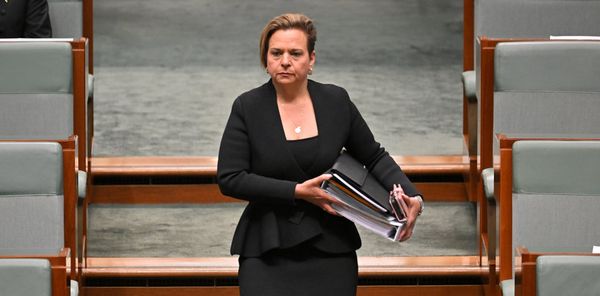
Claudia Tetreault-Percy is Canberra's poster child for sustainable fashion and second-hand style.
Combining retail work at Goodbyes second-hand store on Lonsdale Street with a teaching role in the fashion department at the Canberra Institute of Technology, Ms Tetreault-Percy knows a thing or two about how to slay in a sustainable way.
"My base style is probably quite classic to most people but I love a pop of colour and an accessory," she said.
"I'm all about earrings and bags and shoes."
In its 18 months of operation, Braddon consignment store Goodbyes has sold items for more than 3000 people from Canberra and the region. Their second-hand sales model is designed to keep quality items in circulation and another step away from most clothes' end destination; landfill.
Valuable items, often hardly worn and sometimes brand new, are resold for a fraction of their original price. The store and the clothes' onseller then split the sale 50/50.
Ms Tetreault-Percy said sellers range from well-dressed teens to fashionistas in their 70s, uptake growing "exponentially" as Canberra residents realise the opportunity to pass on their pieces.
"They know they have really good quality pieces they don't wear anymore," she said.
"They also understand that customers are looking for quality."

What to do about Canberran's penchant for consuming goods that become problematic waste streams, like textiles, is a focus of the circular economy strategy currently being developed by the ACT government.
Scheduled for release this year, the strategy will focus on five areas - food and organics, built environment, consumer goods, emerging and problematic waste streams and identifying space for circular economy businesses to cluster.
Ms Tetreault-Percy said one thing many sellers have in common is they've experienced the buyer's remorse that comes with overconsuming.
She said the trick to enjoying fashion responsibly was to remember it works on an approximate 20-year cycle.
"You can find trends that are happening right now in second-hand stores because that cycle kind of comes back around," Ms Tetreault-Percy said.
"When your knee-jerk reaction is to go into a store and buy something that's brand new because you want the latest thing, actually think about what kind of second-hand footprint you're contributing to."
Australians buy an average of 56 items of clothing each year, most of which are made from materials that are energy-intensive to produce and difficult to recycle.
Almost no textile repurposing infrastructure exists at a national scale, and second-hand stores are overwhelmed by unwearable donations.
In the ACT, there are around 21 charities with various exemptions from tip fees that allow them to dispose of clothes for free. The result is tonnes and tonnes going to landfill each year.

The Green Shed is one of the few facilities that accepts donations that has the capacity to ensure nothing gets thrown out.
However, owner Charlie Bigg-Wither admits what happens to the hundreds of kilograms dumped on their doorstep is problematic in a different way.
"If you ever come to our sheds in the January period, there's literally a queue out the gate like, 20, 30, 40 cars deep from 7.30am in the morning until five o'clock at night," he said.
Over summer, between two and three tonnes of clothes are dropped off at The Green Shed every day. The items that can't be sold at their second store in the city are either passed on to Koomarri - a social enterprise that employs people who have an intellectual disability and turns textiles into rags - or given away.
As Koomarri shuts down over the Christmas period, sorters at The Green Shed wheel out cages onto the shed floor and about 600 kilograms of clothes are given away at a time.
Mr Bigg-Wither said sometimes a cage is only out for five minutes before someone backs their vehicle up and takes the entire thing.
"We have a problem with dealers coming in, because they take it all and they send it overseas and sell it," he said.
"It's a little bit tricky for us, because, if they don't take it then it goes to the tip. But I mean, they're not doing it out of the kindness of their hearts, they're doing it because it's a business and that's how they make money."
Mr Bigg-Wither said they're only able to manage the influx of toys, furniture and clothes that comes in after Christmas each year because they've got the space to store it, trying to sort it and sell it is not an option.
"We just could not possibly deal with all the clothes that come in," he said.
"Also, some things are so cheap in the first place that you can't sell them for more than $2 anyway."
As part of its circular economy design, the ACT government is investigating ways to improve product stewardship for various products, including textiles.
They've also started a charity bin trial at the Hume Resource Management Centre to redirect textiles from landfill to Koomarri.
Labor backbencher Suzanne Orr pushed to have textiles included in investigations into circular economy opportunities.
She said the damage textiles do to the environment is significant as materials like polyester contain microplastics, and almost 100 per cent of it becomes waste.
Ms Orr said public feedback from the draft strategy has called for a push towards reusing and repurposing.
She said the ACT government was in a unique position to trial repurposing programs as it managers waste across the whole territory.
Ms Orr said she believed it was a question of improved coordination, rather than new infrastructure, when it came to recycling textiles.
"It varies as to what can be done with clothes, depending on what the material is or what the product is, and how it's been assembled, and how complex it is and how capable you are of pulling it apart," she said.
"There's an opportunity for us to get to the front of this so other jurisdictions can pick up and run with it too."
We've made it a whole lot easier for you to have your say. Our new comment platform requires only one log-in to access articles and to join the discussion on The Canberra Times website. Find out how to register so you can enjoy civil, friendly and engaging discussions. See our moderation policy here.







